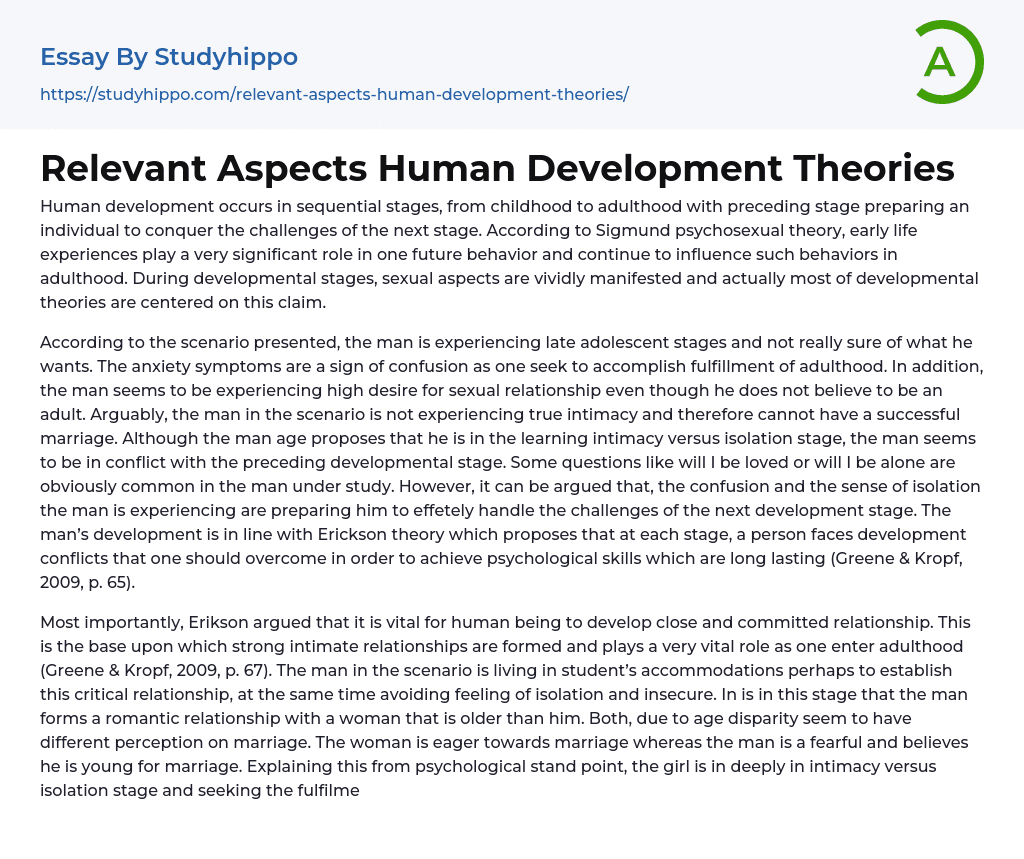Human development advances through a series of sequential stages, starting in childhood and reaching adulthood. Each stage builds on the previous one, providing individuals with the essential abilities to overcome the challenges of the next stage. Sigmund Freud's psychosexual theory highlights the significant effect of early life experiences on future behaviors, which persistently influence even during adulthood. Sexual aspects are prominently present in each developmental stage, making them a central focus in many theories.
This text discusses the scenario of a man who is in the late adolescent stages and is unsure about his desires and goals. The anxiety symptoms indicate confusion as he tries to navigate adulthood. Additionally, the man has a strong desire for sexual relationships despite not considering himself an adult. It is argued that the man lacks true intimacy and, as a result, may
...not have a successful marriage. While his age suggests that he is in the stage of learning intimacy versus isolation, he appears to be in conflict with the developmental stage that came before it.
Some common questions in the study subject include "will I be loved?" and "will I be alone?". However, it can be argued that the confusion and isolation experienced by the individual are actually preparing him to effectively handle the challenges of the next stage of development. The individual's development aligns with Erickson's theory, which suggests that at each stage, a person faces developmental conflicts that must be overcome to acquire long-lasting psychological skills (Greene & Kropf, 2009, p. 65). Importantly, Erikson emphasized the importance of developing close and committed relationships for human beings.
This is the foundation for building strong intimate relationships and it plays
crucial role as one reaches adulthood (Greene ; Kropf, 2009, p. 67). The man in the scenario resides in student accommodations, potentially to create this significant bond while also avoiding feelings of isolation and insecurity. It is during this period that the man initiates a romantic relationship with an older woman.
Both the woman and the man have different views on marriage due to their age difference. The woman desires marriage while the man is fearful and believes he is too young for it. From a psychological perspective, the woman is in the intimacy versus isolation stage and seeks fulfillment through intimate relationships (Shaffer, 2009, p. 103). She wants to avoid isolation and is focused on finding a perfect romantic relationship that will lead to a happy marriage. According to Freud, the man's fear of marriage may be influenced by his previous marriage experience or growing up in a family with frequent marital conflicts.
Feud proposed that certain experiences can produce physical symptoms even if they lack a physical origin. Consequently, negative experiences can lead to a fear of similar causal events. Feud posited that physical symptoms in psychology stem from internal conflicts related to a specific event or situation. To address this, individuals need to undergo psychoanalysis in order to overcome their fear of women. Feud further elucidated this concept using the analogy of an iceberg.
The man in this analogy conceals negative perceptions about marriage due to his past experience. Research shows that individuals who struggle in this stage often have unsuccessful romantic relationships (Strong, Devault, & Cohen, 2011, p. 65). Prolonged struggles can lead to difficulties in developing relationships and experiencing healthy sexual relationships (Shaffer,
2009, p. 72). Consequently, they observe others successfully falling in love, getting married, and starting families.
The woman in the scenario lives with fear, loneliness, and isolation while the man, on the other hand, believes he is not ready for marriage and wants to explore life before committing to marital responsibilities (Shaffer 2009, p. 79).
In conclusion, every human being goes through distinct stages of development from childhood to adulthood. Each stage is equally important as it plays a critical role in shaping and equipping individuals with psychological skills necessary to handle the challenges of adulthood. In fact, one can easily explain human life from a psychological standpoint, providing clear justification for any evident shortcomings.
References
- Greene, R. R., & Kropf, N. P. (2009). Human behavior theory: a diversity framework. New Brunswick, Aldine Transaction.
- Shaffer, D.
R. (2009). Social and personality development. Australia, wads worth/cengage learning.
F. (2011). The marriage and family experience: intimate relationships in a changing society. Belmont, CA, Wadsworth/Cengage Learning.
- My Favorite Place essays
- Overcoming Obstacles essays
- Taking Risks essays
- American Dream essays
- Barriers To Entry essays
- Capitalism essays
- Central Bank essays
- Compensation essays
- Consumerism essays
- Economic Development essays
- Economic Growth essays
- Economic Inequality essays
- Economic System essays
- Economy essays
- Employment essays
- Export essays
- Finance essays
- Free Trade essays
- Gross Domestic Product essays
- Human Development essays
- Income Inequality essays
- Industry essays
- Inflation essays
- International Business essays
- International Trade essays
- Macroeconomics essays
- Materialism essays
- Max Weber essays
- Microeconomics essays
- Minimum Wage essays
- Monetary Policy essays
- Monopoly essays
- Pricing essays
- Profit essays
- Recession essays
- resources essays
- Taxation essays
- Trade essays
- Unemployment essays
- Warehouse essays
- World economy essays
- Adaptation essays
- Adventure essays
- Adversity essays
- Aging essays
- Alcohol essays
- Barbie Doll essays
- Beauty essays
- Care essays
- Carpe diem essays




